介词语法重点和难点解析(一)
介词的用法区别和用法口诀

介词的用法区别和用法口诀一、介词的基本概念和分类介词是英语语法中一种十分重要且常见的词类,用于连接名词、代词或动词与其他句子成分之间的关系。
介词的主要作用是指示名词、代词或动词的位置、方向、时间、方式等。
在句子中,介词常出现在名词短语或从句的开头,并与其后面的成分形成不可分割的整体。
根据其具体功能和用法,介词可以分为以下几类:1. 方位介词:描述事物在空间位置上相对于其他事物的关系。
例如:in(在…里)、on(在…上)、at(在…处)。
2. 时间介词:表示事物发生的时间或持续时间。
例如:in(在…期间)、on (在…时)、at(在…点钟)。
3. 方式介词:表示事物进行活动的方式、手段或方法。
例如:by(通过)、with(用;以;带有)。
4. 原因/目的介词:表示某个行为发生的原因或目标。
例如:for(为了)、because of(因为)。
5. 所属/起源介词:表示某个人或物所属于的组织、地点或来源。
例如:of/from/to(属于/来自/到)。
二、介词的用法区别和常见错误1. in/on/at的用法区别:- in 用于表示在某个大的空间范围内,如城市、国家、房屋等。
例如:in the room(在房间里)、in London(在伦敦)。
- on 用于表示在某个平面或表面上,如桌子、地图等。
例如:on the table (在桌子上)、on the map(在地图上)。
- at 用于表示具体位置或地点,常与动词to be连用。
例如:at the bus stop (在公交车站)、at school(在学校)。
2. by/with的区别:- by 表示通过某种方式或手段进行某个行为。
例如:travel by plane(乘坐飞机旅行)、communicate by email(通过电子邮件交流)。
- with 表示使用某种工具或带有某种特征进行活动。
例如:write with a pen (用钢笔写字)、open the door with a key(用钥匙开门)。
介词语法知识点总结
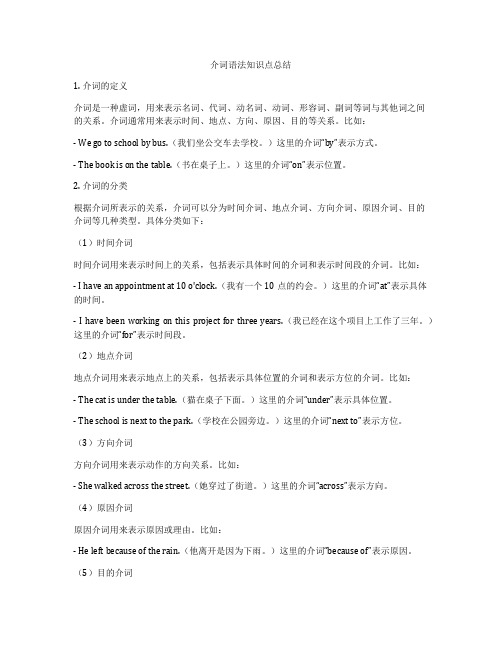
介词语法知识点总结1. 介词的定义介词是一种虚词,用来表示名词、代词、动名词、动词、形容词、副词等词与其他词之间的关系。
介词通常用来表示时间、地点、方向、原因、目的等关系。
比如:- We go to school by bus.(我们坐公交车去学校。
)这里的介词“by”表示方式。
- The book is on the table.(书在桌子上。
)这里的介词“on”表示位置。
2. 介词的分类根据介词所表示的关系,介词可以分为时间介词、地点介词、方向介词、原因介词、目的介词等几种类型。
具体分类如下:(1)时间介词时间介词用来表示时间上的关系,包括表示具体时间的介词和表示时间段的介词。
比如:- I have an appointment at 10 o'clock.(我有一个10点的约会。
)这里的介词“at”表示具体的时间。
- I have been working on this project for three years.(我已经在这个项目上工作了三年。
)这里的介词“for”表示时间段。
(2)地点介词地点介词用来表示地点上的关系,包括表示具体位置的介词和表示方位的介词。
比如:- The cat is under the table.(猫在桌子下面。
)这里的介词“under”表示具体位置。
- The school is next to the park.(学校在公园旁边。
)这里的介词“next to”表示方位。
(3)方向介词方向介词用来表示动作的方向关系。
比如:- She walked across the street.(她穿过了街道。
)这里的介词“across”表示方向。
(4)原因介词原因介词用来表示原因或理由。
比如:- He left because of the rain.(他离开是因为下雨。
)这里的介词“because of”表示原因。
(5)目的介词目的介词用来表示目的或目标。
语法介词专题讲解(1)

Miss Li is standing _a_m__o_n_g_ the students. 在三者或者三者以上之间
4. in front of 和 in the front of
The man is _i_n_f_r_o_n_t_o_f the car.
在……(外部的)前面
The girl is _in__th__e_f_ro_n__t _of the car.
(广西贺州市中考题)
A. from B. of C. by D. in
3.The basket is full___B______ apples.
(北京市中考题)
A. with B. of C. in D. by
4.Kate can't come.Let's ask wei Hua
instead___A___her. (上海市中考题)
8.忙于做某事 be busy _w_i_th__ sth.
9.为---做准备 be ready _fo_r_
10.装满
be full _o_f
11.对-----有好处 be good _fo_r_
12.对------感兴趣 be interested _in____
1.hear from
13. ring up
表示大于一天的时间如__月_,__季__节,__年__,_世__纪用等in
还有: in the morning, in the afternoon , in the evening
泛指 在早上/下午/晚上也用 in
in年in月in季节,有日就用on , 时刻怎
2)时间的前后 before, after 在……之前 在……之后
【免费】中考英语考点难点详解:介词的用法和技巧汇总
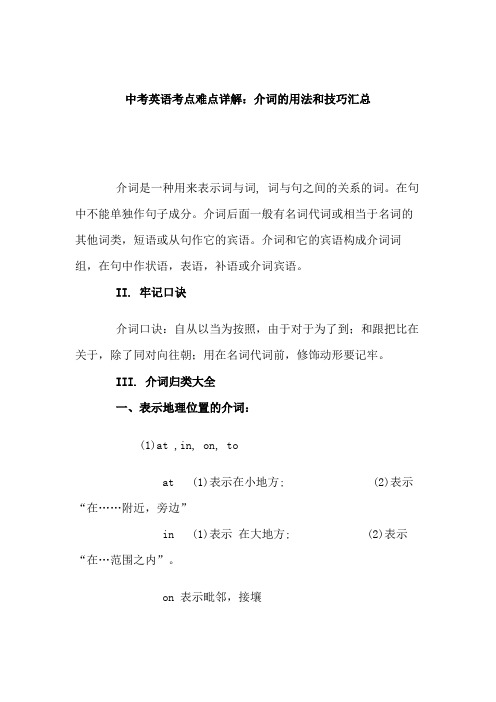
中考英语考点难点详解:介词的用法和技巧汇总介词是一种用来表示词与词, 词与句之间的关系的词。
在句中不能单独作句子成分。
介词后面一般有名词代词或相当于名词的其他词类,短语或从句作它的宾语。
介词和它的宾语构成介词词组,在句中作状语,表语,补语或介词宾语。
II. 牢记口诀介词口诀:自从以当为按照,由于对于为了到;和跟把比在关于,除了同对向往朝;用在名词代词前,修饰动形要记牢。
III. 介词归类大全一、表示地理位置的介词:(1)at ,in, on, toat (1)表示在小地方; (2)表示“在……附近,旁边”in (1)表示在大地方; (2)表示“在…范围之内”。
on 表示毗邻,接壤to 表示在……范围外,不强调是否接壤例句:He arrived at the station at ten.He is sitting at the desk.He arrived in Shanghai yesterday.Jiangsu lies in the east of China.Russia lies on the north of China.Fujian is to the south of Jiangsu Provin ce.(2)above, over, on 在……上above 指在……上方,不强调是否垂直,与 belo w相对;over指垂直的上方,与under相对,但over与物体有一定的空间,不直接接触。
on表示某物体上面并与之接触。
例句:The bird is flying above my head.There is a bridge over the river.He put his watch on the desk.(3)below, under 在……下面under表示在…正下方below表示在……下,不一定在正下方例句 There is a cat under the table.Please write your name below the line.二、表示时间的介词:(1)in , on,at 在……时in表示较长时间,如世纪、朝代、时代、年、季节、月及一般(非特指)的早、中、晚等。
介词知识点的归纳总结

介词知识点的归纳总结一、介词的定义介词是一种虚词,用来连接名词、代词、动名词或者其他成分,构成介词短语,表示时间、地点、方向、方式等关系。
二、介词的分类1. 根据功能(1)时间介词:on, at, in, before, after, during等(2)地点介词:in, on, at, under, above, below等(3)方向介词:to, from, into, out of, along, toward等(4)方式介词:by, with, through, for, like等2. 根据用法(1)简单介词:单个词组成的介词,如in, on, at等(2)复合介词:由两个或两个以上的词组成的介词,如because of, in spite of, on behalfof等3. 根据构词(1)合成介词:由两个或两个以上词组成的介词,如into, toward等(2)派生介词:通过增加后缀或叠加形成的介词,如underneath, throughout等三、介词短语的作用介词短语通常用来修饰名词或者代词,起着修饰、定位、时间、地点、方式等作用。
介词短语在句子中担任着重要的语法成分,需要注意其搭配和使用。
1. 修饰名词或代词介词短语可以修饰名词或代词,起着定语的作用。
如:the book on the table(桌子上的书)2. 表示时间介词短语可以表示时间的起止、时点、持续等概念。
如:at six o'clock(在六点)3. 表示地点介词短语可以表示地点的位置、方向、边界等概念。
如:in the box(在盒子里)4. 表示方式介词短语可以表示动作的方式、手段、原因等。
如:by train(乘火车)四、介词的用法注意事项1. 介词的搭配介词的搭配非常重要,不同的介词搭配可以表达不同的意义。
比如:at school, in the school, on the school都表示不同的含义。
介词总结以及易错点(1)

介词总结以及易错点(1)一、单项选择介词1. He was offered a position at the local church school, he went to the Cambridge.A. after whenB. since whichC. after whichD. since when【答案】C【解析】【详解】考查介词+关系代词形式定语从句。
句意:他被授予了一个在当地教堂的职务,在这件事后他便去了剑桥。
后文发生在“He was offered a position at the local church school”之后,故用after, 指代前句整件事,应用关系代词which, 故选C。
2. We charge parcels weight, rather than individual units.A. in honor ofB. in contact withC. in terms ofD. in connection with 【答案】 C【解析】【详解】考查介词短语。
句意:我们根据包裹的重量,而不是包裹的件数收费。
A.in honor of为了对. …表示敬意; B.in contact with与. .有联系,接触; C.in terms of根据,在. …方面; D. in connection with 与..有关,有联系。
表示根据什么计费。
故选C。
【点睛】rather than 是一个并列连词。
用法如下:与would 连用时,构成“would rather…than.”句式,意思是“宁愿…而不愿…”,表示主观愿望,即在两者之中选择一个。
不与would 连用时,表示客观事实,意为“是…而不是. ;与其.不如…”,它连接的并列成分可以是名词、代词、形容词、介词(短语)、动名词、分句、不定式、动词等。
3.As is known to all, the law requires equal treatment for all, race, religion, or gender.A. in spite ofB.in terms ofC. regardless ofD. in virtue of【答案】C【解析】【详解】考查介词短语辨析。
小升初重难点整理介词的用法归纳

小升初重难点整理介词的用法归纳介词在英语中扮演着非常重要的角色,它能够连接名词、代词、动词或者形容词等词语,帮助我们表达时间、地点、方式、原因等关系。
在小升初的英语考试中,介词的用法是一个重要的考点。
本文将对小升初英语考试中常见的介词用法进行整理和归纳。
一、表示位置和方向的介词1. in- 表示在某个大区域之内:in the room(在房间里)- 表示在某个城市或国家:in Beijing(在北京)- 表示在某个交通工具上:in the car(在车里)2. on- 表示在某个平面上:on the table(在桌子上)- 表示在某个日期或时间:on Monday(在星期一)3. at- 表示在某个点上:at the bus stop(在公交车站)- 表示在某个具体地点:at the park(在公园)4. under- 表示在某个物体下面:under the bed(在床底下)5. behind- 表示在某个物体后面:behind the tree(在树后面)6. next to- 表示在某个物体旁边:next to the library(在图书馆旁边)7. between- 表示在两个物体之间:between the two buildings(在两个建筑物之间)二、表示时间的介词1. in- 表示在某个年、季度、月等的时间段内:in 2022(在2022年) - 表示在某个时间上午或下午:in the morning(在早上)2. on- 表示在某个具体的日期:on June 1st(在6月1日)- 表示在某个星期几:on Sunday(在星期天)3. at- 表示在某个具体的时间点:at 9 o'clock(在9点钟)三、表示原因的介词1. because of- 表示因为某个原因:I couldn't go to the party because of the rain.(因为下雨,我不能去参加聚会)2. due to- 表示由于某个原因:The delay of the flight was due to the bad weather.(航班延误是由于天气恶劣)四、表示方式的介词1. by- 表示通过某种方式:by bus(乘坐公交车)- 表示凭借某种手段:by using a calculator(通过使用计算器)2. with- 表示使用某种工具或方式:write with a pen(用钢笔写)五、表示比较和区别的介词1. like- 表示像某人或某物:She looks like her mother.(她长得像她妈妈) - 表示和...相似:He plays basketball like a professional.(他打篮球像个职业球员)2. unlike- 表示和...不同:Unlike his brother, he doesn't like sports.(和他哥哥不同,他不喜欢运动)六、表示目的的介词1. for- 表示为了某个目的:I bought a gift for my friend.(我给朋友买了一份礼物)2. to- 表示朝着某个目的地或目标:I am going to school.(我正要去学校)总结:介词在英语中的用法是一个重要的语法考点,对于小升初的考生来说尤为关键。
初中英语介词的语法解析(一)
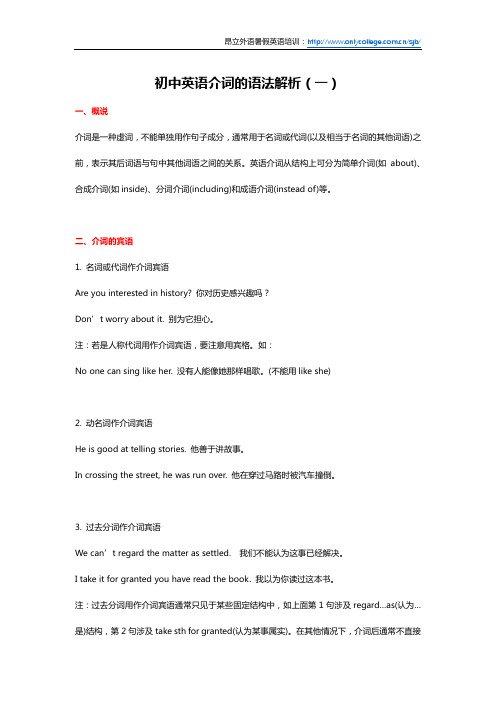
初中英语介词的语法解析(一)一、概说介词是一种虚词,不能单独用作句子成分,通常用于名词或代词(以及相当于名词的其他词语)之前,表示其后词语与句中其他词语之间的关系。
英语介词从结构上可分为简单介词(如about)、合成介词(如inside)、分词介词(including)和成语介词(instead of)等。
二、介词的宾语1. 名词或代词作介词宾语Are you interested in history? 你对历史感兴趣吗?Don’t worry about it. 别为它担心。
注:若是人称代词用作介词宾语,要注意用宾格。
如:No one can sing like her. 没有人能像她那样唱歌。
(不能用like she)2. 动名词作介词宾语He is good at telling stories. 他善于讲故事。
In crossing the street, he was run over. 他在穿过马路时被汽车撞倒。
3. 过去分词作介词宾语We can’t regard the matter as settled. 我们不能认为这事已经解决。
I take it for granted you have read the book. 我以为你读过这本书。
注:过去分词用作介词宾语通常只见于某些固定结构中,如上面第1句涉及regard…as(认为…是)结构,第2句涉及take sth for granted(认为某事属实)。
在其他情况下,介词后通常不直接跟过去分词作宾语,若语义上需要接过去分词(表被动),可换用“being+过去分词”:He went out without being seen by the others. 他出去了,没有被其他人看见。
4. 从句作介词宾语He was not satisfied with what she said. 他对她说的不满意。
I’m worried about where he is. 我担心他上哪儿去了。
介词知识点归纳 及解析

介词知识点归纳及解析一、选择题1.A new bridge the Yangtze River in Nanjing opened to traffic on Dec. 24, 2020. A.through B.over C.on D.along2.My family get together and have a big dinner ________ Sundays.A.at B.in C.on D.to3.It is a good idea to experience life ________ the school by volunteering. Take an active part in it, and you will make a difference to the world.A.above B.beyond C.over D.against4.The rain is beating ________ the windows and Cindy is listening to the rain quietly. A.above B.across C.around D.against5.—You look frightened, what’s up?— A terrible accident happened this morning. A truck was running fast when an old man was about to cross the road. I bet he will not live ________ the night.A.along B.away C.through D.in6.The ending of the film Diary of Dinosaurs was so surprising and fully went ________ my imagination.A.across B.over C.through D.beyond7.________small actions, like reusing water, we can make a great difference to our world. A.Across B.Beyond C.Through D.Against 8.Taking part in a social activity can help take your mind ________ matters that worry you and make you feel good about yourself.A.through B.across C.off D.into9.There is a stone bridge ________ the river in front of my house.A.over B.under C.above D.below10.I like reading. I often fill my bookshelf ________ all kinds of books, like novels, detective stories, and so on.A.on B.in C.with D.of11.—The boy is tall enough ________ his age.—Yes, I was much shorter when I was his age.A.of B.at C.from D.for12.She was forced to marry ________ her mind to receive the following painful life. A.against B.with C.by D.in13.—It’s raining heavily outside. May I push my bicycle into your house?—Certainly. But please put it _________ the wall so that it won’t take u p too much space.A.in B.on C.against D.over14.The blue planet is so far from the earth that radio signals, travel ________ the speed of light, take 16 hours to reach the spacecraft.A.for B.in C.on D.at15.________ Friday afternoon, our school ends earlier than usual.A.At B.On C.To D.In16.Everyone was touched ________ words after they watched the film Hi, MOM 《你好,李焕英》directed by Jia Ling.A.under B.across C.beyond D.against 17.—When is your birthday?—My birthday is ________ August 21st.A.on B.at C.in D.for18.The girl is ________ a singer ________ everyone in her hometown.A.well known as; for B.well-know as; toC.well known as; to D.best known for; for19.The girl is _____ a singer _____ everyone in her hometown.A.well known as; for B.well known as; to C.well-know as; to D.best known for; for 20.Sometimes I feel stressed because what my parents want me to do has gone ________ my ability.A.through B.against C.above D.beyond21.Peter is clever enough to read and write __________ the age of 4.A.between B.at C.to D.during22.The little stream ran dawn from a high mountain ________ many villages and forests. A.across B.against C.beyond D.through 23.Xuzhou Metro Line 2 came into use ________ November 28, 2020, it is one of the most important events in our daily life.A.at B.in C.on D.for 24.—Thanks for looking after me ________ my illness, Millie.—Don’t mention it. That’s what friends are for.A.through B.among C.with D.across25.The story The Ugly Duckling ________ Hans Christian Andersen has remained popular among children for centuries.A.in B.on C.by D.with26.________ a spring morning, a bird flew into our classroom and we were very excited to see it. A.In B.On C.At D.For27.If success is a gate, the road ________ this gate must be full of difficulties.A.beyond B.opposite C.towards D.across28.— Would you like to visit the zoo with me now?—Sorry, it’s _______ the visiting hours. Let’s go there tomorrow.A.beyond B.through C.during D.on29.To fully understand the writer, we must read not only between the lines, but sometimes________ the lines.A.within B.beyond C.beside D.among30.If your temperature is_______37.3°, you should go to the doctor instead of going to school. A.above B.against C.under D.below31.— When will Mr. Smith arrive?— ________ September 6th.A.At B.In C.On D.For32.—It's reported that Stanley Ho Hung-sun passed away on May 26th at the age of 98.—The whole country felt sad about that. As a successful businessman, his contribution to society and love for the motherland went far ________ his wealth.A.beside B.over C.beyond D.above33.Bees and butterflies play _______ flowers. Then they hide _______ the April showers. A.among; from B.among; in C.with; in D.with; on 34.China sent up the final satellite of Beidou Navigation Satellite System(北斗卫星导航系统) from Xichang Satellite Center___________ June 23,2020.A.at B.in C.to D.on35.When are you arriving? I’ll pick you up the station.A.at B.to C.on D.off36.To my pleasure, my family is always ________me, so I can follow my dreams with great courage.A.past B.above C.upon D.behind 37.—There have been great changes in Taizhou in the past few years.—I can't agree more. The changes there are ________ my imagination.A.near B.past C.along D.beyond 38.Armstrong joined the navy in 1949 and served _______ a pilot for three years.A.with B.like C.to D.as39.He has developed a good habit of running ________ the lake every morning.A.over B.along C.beyond D.across 40.Because of COVID-19, this summer holiday will begin ________ July 18.A.on B.in C.for D.at【参考答案】一、选择题1.B解析:B【详解】句意:南京长江上的一座新桥于2020年12月24日通车。
语法重难点解析

语法重难点解析一、介词的使用介词是英语语法中的重要部分,它们用于表示时间、地点、原因、方式等等。
在使用介词时,需要特别注意以下几个重难点:1. 介词的搭配有些介词只能与特定的词语或短语搭配使用,例如:- agree with:同意某人的观点- rely on:依靠某人或某物- interested in:对某事感兴趣- capable of:有能力做某事要注意掌握这些固定的介词搭配,避免使用错误的组合。
2. 介词的用法区别有些介词在不同的情境下会有不同的用法,例如:- at/in/on:这三个介词都表示时间,但使用的场景不同。
at用于具体的时间点,如at 8 o'clock;in用于较长的时间段,如in the morning;on用于特定的日期,在星期几时使用,如on Friday。
- for/since:这两个介词都表示时间段,但具体的使用场景不同。
for 用于表示持续的时间段,如for two hours;since用于表示起点的时间,如since 2001。
要注意这些介词的不同用法,以免造成理解上的困惑。
二、时态的使用英语的时态是词法考试中的重点难点之一,正确运用时态可以使语句更准确地表达。
以下是一些常见的时态使用问题:1. 一般现在时一般现在时用于表示客观事实、习惯性动作或普遍真理。
例如:- The sun rises in the east.(太阳从东方升起。
)- I usually go to work by bus.(我通常乘公交车上班。
)需要注意的是,一般现在时中第三人称单数动词要加-s或-es结尾。
2. 一般过去时一般过去时用于表示过去某个时间发生的动作或状态。
例如:- I watched a movie last night.(昨晚我看了一部电影。
)在一般过去时中,动词的过去式形式是需要掌握的重点。
3. 现在进行时现在进行时用于表示现阶段正在进行的动作。
例如:- She is studying English at the moment.(她现在正在学习英语。
介词的知识点总结
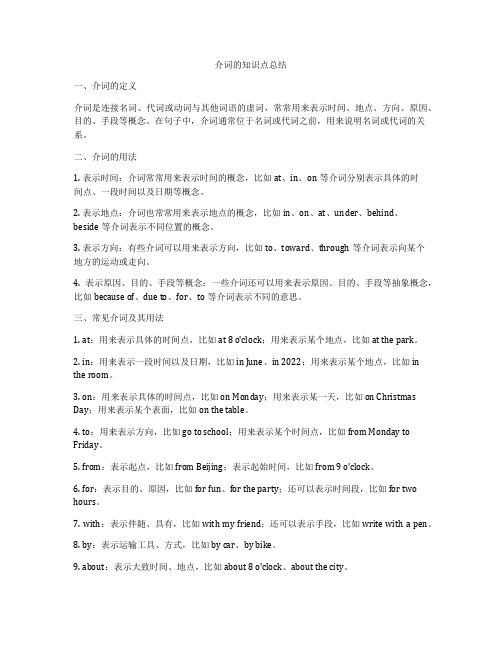
介词的知识点总结一、介词的定义介词是连接名词、代词或动词与其他词语的虚词,常常用来表示时间、地点、方向、原因、目的、手段等概念。
在句子中,介词通常位于名词或代词之前,用来说明名词或代词的关系。
二、介词的用法1. 表示时间:介词常常用来表示时间的概念,比如at、in、on等介词分别表示具体的时间点、一段时间以及日期等概念。
2. 表示地点:介词也常常用来表示地点的概念,比如in、on、at、under、behind、beside等介词表示不同位置的概念。
3. 表示方向:有些介词可以用来表示方向,比如to、toward、through等介词表示向某个地方的运动或走向。
4. 表示原因、目的、手段等概念:一些介词还可以用来表示原因、目的、手段等抽象概念,比如because of、due to、for、to等介词表示不同的意思。
三、常见介词及其用法1. at:用来表示具体的时间点,比如at 8 o'clock;用来表示某个地点,比如at the park。
2. in:用来表示一段时间以及日期,比如in June、in 2022;用来表示某个地点,比如in the room。
3. on:用来表示具体的时间点,比如on Monday;用来表示某一天,比如on Christmas Day;用来表示某个表面,比如on the table。
4. to:用来表示方向,比如go to school;用来表示某个时间点,比如from Monday to Friday。
5. from:表示起点,比如from Beijing;表示起始时间,比如from 9 o'clock。
6. for:表示目的、原因,比如for fun、for the party;还可以表示时间段,比如for two hours。
7. with:表示伴随、具有,比如with my friend;还可以表示手段,比如write with a pen。
介词知识点总结文库
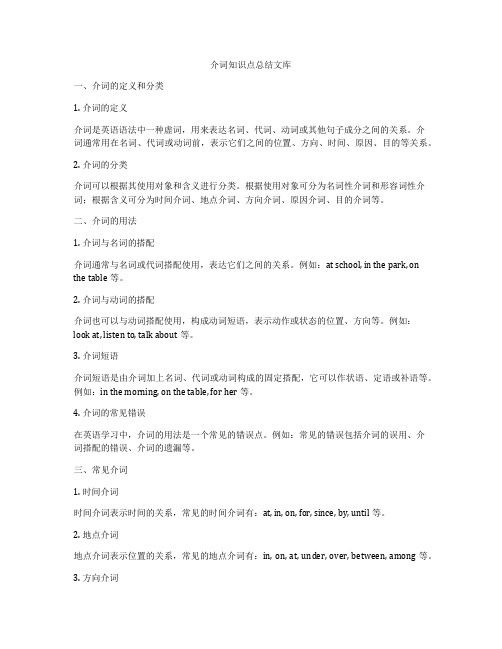
介词知识点总结文库一、介词的定义和分类1. 介词的定义介词是英语语法中一种虚词,用来表达名词、代词、动词或其他句子成分之间的关系。
介词通常用在名词、代词或动词前,表示它们之间的位置、方向、时间、原因、目的等关系。
2. 介词的分类介词可以根据其使用对象和含义进行分类。
根据使用对象可分为名词性介词和形容词性介词;根据含义可分为时间介词、地点介词、方向介词、原因介词、目的介词等。
二、介词的用法1. 介词与名词的搭配介词通常与名词或代词搭配使用,表达它们之间的关系。
例如:at school, in the park, on the table等。
2. 介词与动词的搭配介词也可以与动词搭配使用,构成动词短语,表示动作或状态的位置、方向等。
例如:look at, listen to, talk about等。
3. 介词短语介词短语是由介词加上名词、代词或动词构成的固定搭配,它可以作状语、定语或补语等。
例如:in the morning, on the table, for her等。
4. 介词的常见错误在英语学习中,介词的用法是一个常见的错误点。
例如:常见的错误包括介词的误用、介词搭配的错误、介词的遗漏等。
三、常见介词1. 时间介词时间介词表示时间的关系,常见的时间介词有:at, in, on, for, since, by, until等。
2. 地点介词地点介词表示位置的关系,常见的地点介词有:in, on, at, under, over, between, among等。
3. 方向介词方向介词表示方向的关系,常见的方向介词有:to, from, into, out of, through, across等。
4. 原因介词原因介词表示原因的关系,常见的原因介词有:because of, due to, owing to等。
5. 目的介词目的介词表示目的的关系,常见的目的介词有:for, to, in order to, so as to等。
【高中英语】语法要点之介词的用法

【高中英语】语法要点之介词的用法1.带to不定式用法之一:带to不定式有逻辑宾语在前时,to后动词用及物动词;不及物时需跟介词。
theworkistoohardformetodo.(work做及物动词do的逻辑宾语)我去哪儿了。
(及物动词say的逻辑宾语为nothing)ihavealettertowrite.(letter是及物动词write的逻辑宾语)而以下情况有介词:我和他一起写了一封信。
(用钢笔写一封信,所以应该有“使用”这个词,所以加上。
)thezooisnotagoodplaceforanimalstolivein。
(living in zoo,zoo是living in的逻辑宾语,所以不及物动词live加上介词in。
)tomhasnofriendstotalkto.(friends是talkto的逻辑宾语,to不可少。
)她拒绝了我们的邀请。
(他是catchupwith的逻辑对象。
)这里没有斯托西顿。
(坐在座位上,所以坐后再加上。
)2.(a)little/(a)few:1few,little“几乎没有;少”否定词。
few加可数名词复数,little加不可数名词。
thereislittlewaterinthebottle,isthere?(前否定,后肯定)Tomissoshythathat有几个朋友2afew“一些”肯定词,加可数名词复数;alittle“一些;一点”也是肯定词,加不可数名词。
tomisnotanenglishman,butheknowsalittleenglish。
3.此外,在单词“太”、“很”、“所以”等之后,使用“现在”、“很少”;在only、just、still等之后,使用afew、alittle但quite少数/很少被翻译为“many”,分别相当于many和much。
(注:有时alittle…。
并不是固定短语。
如:alittlesheep译为“一只小羊”)3.及物动词+副词:put on/put off/put away/put away/put up/put up/putdown/put out;崩溃turnon(打开)/turnoff(关闭)/turnup(调大)/turndown(关小);getback(取回);用完;切碎吃起来卖完喝彩giveaway(赠送)/giveout(发放)/giveup(放弃)/giveback(归还);pickup(捡起、拿起)试用/试用;打电话;清理/清除;setup(成立);thinkup(想出;想起);handin(上交)/handout(分发;散发);修理;锻炼和打扮;帮助摆脱困境keepoff/keepout(阻止;挡住);takeoff(脱下)/takeaway(拿走)/takeout(拿出);查找/查找;扔掉/停止唤醒;减记(减记);失望;弥补;抵消(触发)注:名词做以上短语的宾语,可放在它们中间或后边;而代词做宾语,只放在中间。
介词的正确用法和常见错误

介词的正确用法和常见错误介词在英语语法中扮演着非常重要的角色,它用于表达名词、代词、动词或形容词与其他部分之间的关系。
然而,由于介词的多样性和灵活性,很多学习者在使用介词时常常出现一些常见错误。
本文将介绍介词的正确用法,并指出容易出错的地方,以帮助读者更好地运用介词。
一、介词的基本定义和用法介词是一类虚词,通常位于名词、代词、动词或形容词之前,用于引导它们与其他成分之间的关系。
常见的介词包括:in(在)、on (在、上)、at(在)、about(关于)、over(在……上方)、under (在……下方)、between(在……之间)、among(在……之中)等。
介词的主要作用有:1. 表示位置关系:如in(在)、on(在、上)、at(在)等。
例如:She is studying in her room.(她正在自己的房间里学习。
)2. 表示时间关系:如at(在)、on(在、在……上)、in(在、在……之间)等。
例如:We will have a meeting at 3 p.m.(下午3点我们将开会。
)3. 表示方式或原因:如by(通过、凭借)、for(为了)、with (用、以、随着)等。
例如:He won the game by his excellent performance.(他凭借出色的表现赢得了比赛。
)4. 表示目标或方向:如to(到、向)、toward(s)(朝、向)等。
例如:I'm going to the bookstore.(我要去书店。
)二、常见错误用法及改正尽管介词相对灵活,但常常导致学习者出现一些错误用法。
以下是一些常见错误及相应的改正措施:1. 在表示时间时错误地使用介词:例如,“I will meet you on tomorrow.”(我明天会见你。
)这里的错误在于使用了“on tomorrow”,而应改为“I will meet you tomorrow.”(明天我会见你。
中考英语重难点语法详解介词和连词与否定方式
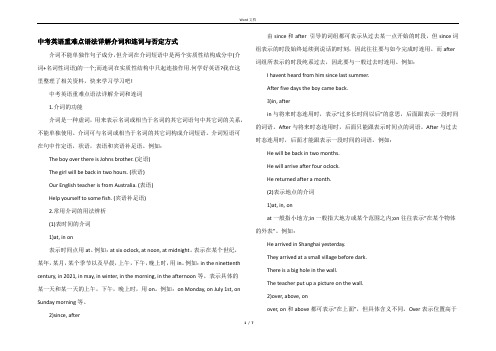
中考英语重难点语法详解介词和连词与否定方式介词不能单独作句子成分,但介词在介词短语中是两个实质性结构成分中(介词+名词性词语)的一个;而连词在实质性结构中只起连接作用.何学好英语?我在这里整理了相关资料,快来学习学习吧!中考英语重难点语法详解介词和连词1.介词的功能介词是一种虚词,用来表示名词或相当于名词的其它词语句中其它词的关系,不能单独使用。
介词可与名词或相当于名词的其它词构成介词短语。
介词短语可在句中作定语,状语,表语和宾语补足语。
例如:The boy over there is Johns brother. (定语)The girl will be back in two hours. (状语)Our English teacher is from Australia. (表语)Help yourself to some fish. (宾语补足语)2.常用介词的用法辨析(1)表时间的介词1)at, in on表示时间点用at。
例如:at six oclock, at noon, at midnight。
表示在某个世纪,某年,某月,某个季节以及早晨,上午,下午,晚上时,用in。
例如:in the ninettenth century, in 2021, in may, in winter, in the morning, in the afternoon等。
表示具体的某一天和某一天的上午,下午,晚上时,用on。
例如:on Monday, on July 1st, on Sunday morning等。
2)since, after由since和after 引导的词组都可表示从过去某一点开始的时段,但since词组表示的时段始终延续到说话的时刻,因此往往要与如今完成时连用。
而after 词组所表示的时段纯系过去,因此要与一般过去时连用。
例如:I havent heard from him since last summer.After five days the boy came back.3)in, afterin与将来时态连用时,表示“过多长时间以后”的意思,后面跟表示一段时间的词语。
解析语法难点动词短语与介词短语的用法与区别

解析语法难点动词短语与介词短语的用法与区别动词短语和介词短语都是英语语法中比较常见的短语结构。
它们在句子中充当不同的语法成分,有着特定的用法和区别。
本文将对动词短语和介词短语的用法与区别进行解析。
一、动词短语的用法与特点动词短语由动词和其后的宾语或其他修饰语构成,可以在句子中充当谓语或状语。
动词短语有以下几个常见特点。
1. 动词短语作为谓语动词短语作为谓语时,通常由及物动词和宾语构成。
例如,“Sheate an apple.”(她吃了一个苹果)中的“ate an apple”就是一个动词短语,其中的动词“ate”是及物动词,后面跟了宾语“an apple”。
2. 动词短语作为状语动词短语作为状语时,表示动作发生的方式、结果、时间等。
例如,“He ran quickly to catch the bus.”(他快速跑去赶公交车)中的“ran quickly to catch the bus”就是一个动词短语,它修饰了谓语动词“ran”,表示了动作的方式。
3. 动词短语的时态和语态变化动词短语的时态和语态变化主要取决于动词的变化。
例如,“They will vi sit their grandparents tomorrow.”(他们明天将去看望他们的祖父母)中的“will visit their grandparents”是一个动词短语,其中的动词“visit”根据时态变化使用了将来时。
同样地,“He was being taught by his teacher.”(他正在被他的老师教导)中的“was being taught by his teacher”是一个动词短语,其中的动词“be”根据语态变化使用了被动语态。
二、介词短语的用法与特点介词短语由介词和其后的名词、代词或其他修饰语构成,用于表示地点、时间、方式、原因等。
介词短语有以下几个常见特点。
1. 介词短语作为定语或后置定语介词短语作为定语时,通常修饰名词或代词。
语法重点解析介词的常见用法

语法重点解析介词的常见用法介词是英语语法中的重要部分,用于连接名词、代词、动词等成分,起到关系和修饰的作用。
本文将对介词的常见用法进行重点解析。
一、表示地点方向的介词1. in:表示在某个范围或限定的区域内。
例如:- There is a book on the table.(桌子上有一本书。
)- I live in China.(我住在中国。
)2. on:表示在平面或表面之上。
例如:- The cat is sitting on the chair.(猫坐在椅子上。
)- Please put the pen on the desk.(请把笔放在桌子上。
)3. at:表示在某个特定的位置或地点。
例如:- I will meet you at the airport.(我会在机场和你见面。
)- He is waiting for you at the bus stop.(他在公交车站等你。
)4. to:表示目标或方向。
例如:- She went to the cinema with her friends.(她和朋友们去了电影院。
)- He is walking to school.(他正往学校走。
)二、表示时间的介词1. at:表示具体的时间点。
例如:- We have a meeting at 9 o'clock.(我们九点有个会议。
)- The party starts at noon.(晚会中午开始。
)2. in:表示在某个时间段或范围内。
例如:- I usually have breakfast in the morning.(我通常早上吃早餐。
)- She will arrive in a few minutes.(她几分钟后会到。
)3. on:表示某天或某个日期。
例如:- We are going to have a picnic on Sunday.(我们打算周日去野餐。
)- His birthday is on July 10th.(他的生日是在7月10日。
介词的语法特点有哪些如何掌握
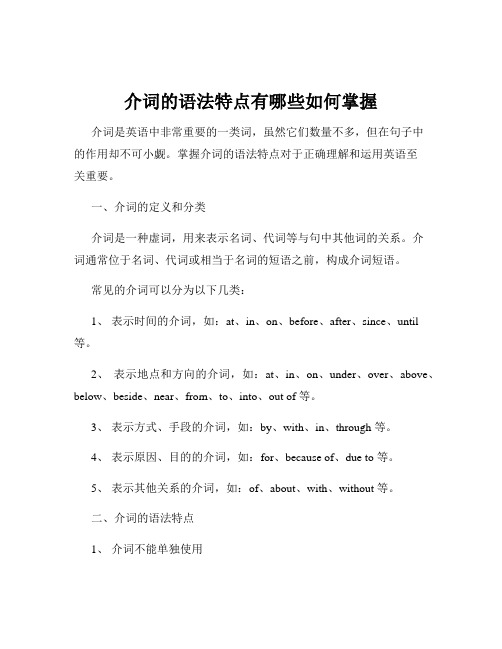
介词的语法特点有哪些如何掌握介词是英语中非常重要的一类词,虽然它们数量不多,但在句子中的作用却不可小觑。
掌握介词的语法特点对于正确理解和运用英语至关重要。
一、介词的定义和分类介词是一种虚词,用来表示名词、代词等与句中其他词的关系。
介词通常位于名词、代词或相当于名词的短语之前,构成介词短语。
常见的介词可以分为以下几类:1、表示时间的介词,如:at、in、on、before、after、since、until 等。
2、表示地点和方向的介词,如:at、in、on、under、over、above、below、beside、near、from、to、into、out of 等。
3、表示方式、手段的介词,如:by、with、in、through 等。
4、表示原因、目的的介词,如:for、because of、due to 等。
5、表示其他关系的介词,如:of、about、with、without 等。
二、介词的语法特点1、介词不能单独使用介词必须与名词、代词或相当于名词的短语一起构成介词短语,在句中充当状语、定语、表语等成分。
例如:“He is in the room”(他在房间里。
)“The book on the table is mine”(桌子上的书是我的。
)2、介词后的宾语通常是名词、代词或动名词名词作介词宾语是最常见的情况,如:“at school”(在学校)。
代词作宾语时要用宾格形式,如:“with him”(和他一起)。
动名词作宾语的情况也不少,如:“be good at swimming”(擅长游泳)。
3、介词短语在句中的位置比较灵活可以放在句首、句中或句末,例如:“In the morning, I usually go fora walk”(早上,我通常去散步。
)“I usually go for a walk in the morning”(我通常早上去散步。
)4、一些介词有固定的搭配例如:“be interested in”(对感兴趣)、“be good at”(擅长)、“be different from”(与不同)等。
介词的重点难点分析

介词的重点难点分析一、in + 年、月、季on + 日at + 点e.g.1 on a cold winter morning; _______ May, 2008二、on Christmas Day; at Christmas三、for + 一段时间How long …….?in + 一段时间How soon ……?四、above 不垂直不接触over 垂直不接触on 接触五、in English 用英语in on e’s own words 用某人自己的话e.g.1 He speaks English well. He writes the paper in English.六、get on the bus get off the busget into the car/taxi get out of the car/taxi七、in front of 在…前面in the front of 在…前部e.g.1 He sits ___________ the classroom, doing his homework.八、near beside next to close to八、across 从..面上通过through 从里面通过九、between 两者之间among 三者、三者以上He is the best one among all the students in his class.十、on one’s way to…on one’s way home/here/there十一、固定搭配:用..材料:withat least/ at most in time run out of be keen on in a hurry think of by the way in surprise try on for example live on to one’s joy for the time being on time in addition with great care on business中考题:1. Wushu is becoming more and more popular _______ foreigners. ( 2002)A. amongB. forC. inD. to2. Betty, let’s make a cake _______ some flour, sugar, butter and milk. ( 2008)A> at B. of C. in D. with3. Steven and William are keen ________ playing computer games.A. toB. withC. onD. at专项训练:1.Mrs. Brown came to China ____ 1996.A.from B.of C.to D.in2.The room was full ____ smoke after the big fire.A.of B.with C.in D.for3.Here are some presents ____ you ____ our best wishes.A.to; with B.for; with C.of; about D.for; for4.Both Mr Green and Mrs Green were born ____ June, 1956.A.in B.at C.on D.for5.The little boy is always interested ____ science.A.with B.by C.in D.at6.Li Lei often gets up ____ seven o'clock on Sundays.A.on B.in C.at D.for7.They arrived early ____ a Tuesday morning.A.on B.at C.in D.of8.Macao(澳门)will return to our motherland ____ December 20th, 1999.A.on B.at C.in D.for9.----When were you born? ----I was born ____ August 25, 1983.A.on B.in C.at D.to12.The visitors ____ Japan arrived ____ Beijing Station last Tuesday morning.A.from; at B.of; to C.from; to D.of; on 13.The teacher will be back ____ an hour.A.in B.after C.on15.It's cold outside. Please your warm clothes.A. put inB. take offC. put onD. put up16.He got many gifts his birthday his friends.A. on, fromB. in, ofC. at, toD. from, for 17.The classroom is quite different that one.A. ofB. fromC. withD. like 18.Look, you'll see a bridge the river.A. onB. aboveC. overD. in19.–Your coat looks nice, Is It cotton? -Yes. It's Shanghai.A. made of, made byB. made of, made inC. made for, made inD. made from made by。
介词语法重点和难点解析(一)
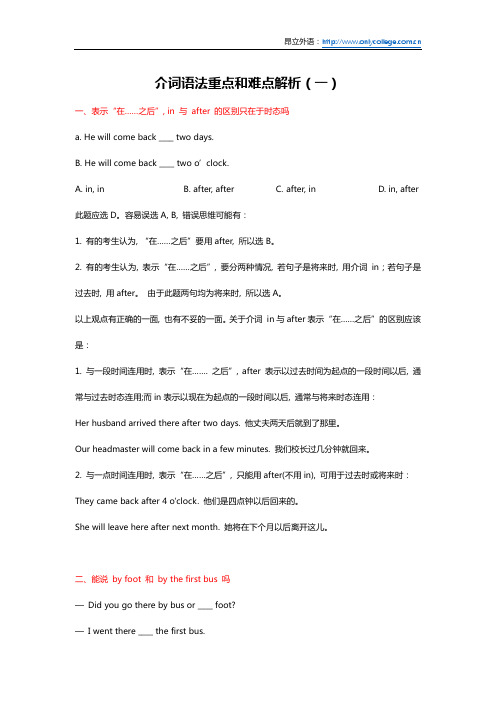
介词语法重点和难点解析(一)一、表示“在……之后”, in 与after 的区别只在于时态吗a. He will come back ____ two days.B. He will come back ____ two o’clock.A. in, inB. after, afterC. after, inD. in, after 此题应选D。
容易误选A, B, 错误思维可能有:1. 有的考生认为, “在……之后”要用after, 所以选B。
2. 有的考生认为, 表示“在……之后”, 要分两种情况, 若句子是将来时, 用介词in;若句子是过去时, 用after。
由于此题两句均为将来时, 所以选A。
以上观点有正确的一面, 也有不妥的一面。
关于介词in与after表示“在……之后”的区别应该是:1. 与一段时间连用时, 表示“在……. 之后”, after 表示以过去时间为起点的一段时间以后, 通常与过去时态连用;而in表示以现在为起点的一段时间以后, 通常与将来时态连用:Her husband arrived there after two days. 他丈夫两天后就到了那里。
Our headmaster will come back in a few minutes. 我们校长过几分钟就回来。
2. 与一点时间连用时, 表示“在……之后”, 只能用after(不用in), 可用于过去时或将来时:They came back after 4 o'clock. 他们是四点钟以后回来的。
She will leave here after next month. 她将在下个月以后离开这儿。
二、能说by foot 和by the first bus 吗—Did you go there by bus or ____ foot?—I went there ____ the first bus.A. on, atB. on, byC. by, onD. by, in此题应选B。
- 1、下载文档前请自行甄别文档内容的完整性,平台不提供额外的编辑、内容补充、找答案等附加服务。
- 2、"仅部分预览"的文档,不可在线预览部分如存在完整性等问题,可反馈申请退款(可完整预览的文档不适用该条件!)。
- 3、如文档侵犯您的权益,请联系客服反馈,我们会尽快为您处理(人工客服工作时间:9:00-18:30)。
介词语法重点和难点解析(一)
一、表示“在……之后”, in 与after 的区别只在于时态吗
a. He will come back ____ two days.
B. He will come back ____ two o’clock.
A. in, in
B. after, after
C. after, in
D. in, after 此题应选D。
容易误选A, B, 错误思维可能有:
1. 有的考生认为, “在……之后”要用after, 所以选B。
2. 有的考生认为, 表示“在……之后”, 要分两种情况, 若句子是将来时, 用介词in;若句子是过去时, 用after。
由于此题两句均为将来时, 所以选A。
以上观点有正确的一面, 也有不妥的一面。
关于介词in与after表示“在……之后”的区别应该是:
1. 与一段时间连用时, 表示“在……. 之后”, after 表示以过去时间为起点的一段时间以后, 通常与过去时态连用;而in表示以现在为起点的一段时间以后, 通常与将来时态连用:
Her husband arrived there after two days. 他丈夫两天后就到了那里。
Our headmaster will come back in a few minutes. 我们校长过几分钟就回来。
2. 与一点时间连用时, 表示“在……之后”, 只能用after(不用in), 可用于过去时或将来时:They came back after 4 o'clock. 他们是四点钟以后回来的。
She will leave here after next month. 她将在下个月以后离开这儿。
二、能说by foot 和by the first bus 吗
—Did you go there by bus or ____ foot?
—I went there ____ the first bus.
A. on, at
B. on, by
C. by, on
D. by, in
此题应选B。
容易误选C, 错误思路为:由by plane, by bus, by plane, by bike等推出by foot;又因为by bus 等不用冠词, 所以反过来, 用了冠词则不用by, 而用on, in等。
此题要选B。
介词by表示“乘坐”交通工具要注意:
1. 后接交通工具(bus, bike, train等)或与交通工具密切相关的名词(air, water等), 在句中主要用作方式状语( 有时也用作表语等), 注意不用冠词或其它限定词:
Do you go to school by bus or by bike? 你上学是乘公共汽车还是骑自行车?
He came here by air, not by train. 他是坐飞机来的, 不是坐火车来的。
2. 若表示交通工具的名词有定语修饰, 则可以用冠词:
I'm going by the 9:30 train. 我坐9:30的火车去。
We went to Shanghai by a large ship. 我们乘一艘大船去上海。
3. “步行”或“骑马”, 英语用介词on:He came hereon foot (horseback). 他是步行(骑马)来的。
4. 以下表达与上述用法类似(注意:也不用冠词或其它限定词):
by phone 用电话by telegram 用电报
by letter 用信件by express 用快件
by post 用邮寄by radio 用无线电by hand 用手工by machine 用机器。
